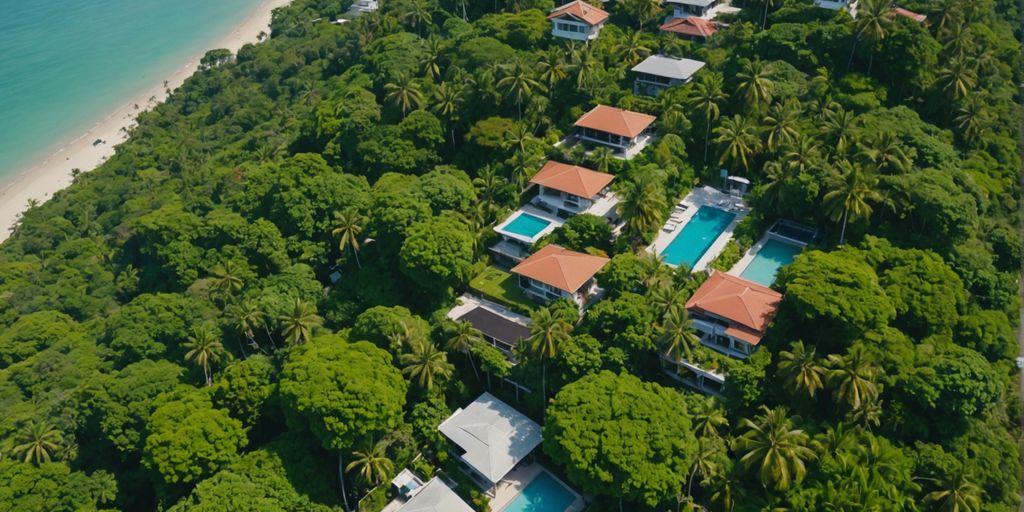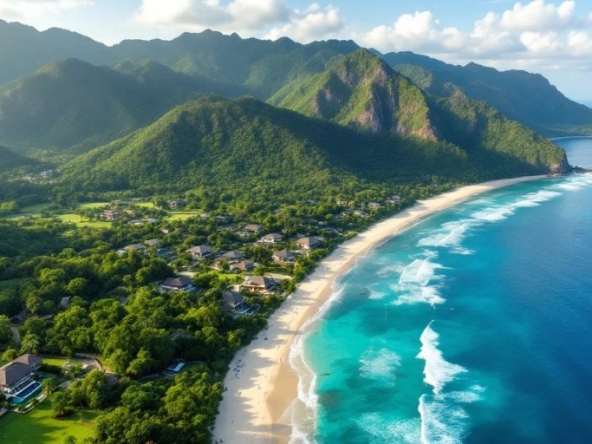Investing in property in Koh Samui, Thailand, offers a unique blend of opportunities and challenges. With its booming real estate market, driven by tourism and economic growth, Koh Samui has become an attractive destination for investors looking to capitalize on rising property values and rental income. However, potential investors must also navigate legal complexities, market volatility, and environmental concerns. This article explores the pros and cons of investing in property in Koh Samui, providing a comprehensive guide to help you make an informed decision.
Key Takeaways
- Koh Samui’s property market has seen significant growth since it became a municipality in 2012, making it an attractive investment option.
- The island’s thriving tourism industry ensures a constant stream of rental income, providing investors with steady cash flow.
- Investing in Koh Samui offers diverse opportunities, from luxury villas to commercial real estate, catering to various investment strategies.
- Potential investors must navigate legal and regulatory challenges, including foreign ownership laws and property taxes.
- Environmental concerns and market volatility are important factors to consider when investing in Koh Samui’s real estate market.
Economic Growth and Investment Potential
Koh Samui has emerged as a promising destination for property investment, driven by its robust economic growth and diverse investment opportunities. Thailand’s economy is expected to soar by 15.1% in the coming 5 years, resulting in an average GDP growth rate of 3%. This economic upswing is likely to have a positive impact on the property market in Koh Samui, making it an attractive option for investors.
Rising Property Values
The property market in Koh Samui has seen a steady increase in values over the past few years. This trend is expected to continue, fueled by the island’s growing popularity as a tourist destination and the government’s policies to attract foreign investment. For instance, the seaside serenity in Lamai offers a beachfront villa with dual investment potential, priced at 25,000,000 THB. Such properties not only promise capital appreciation but also provide a steady rental income.
Tourism-Driven Rental Income
Tourism is a significant driver of rental income in Koh Samui. The island’s beautiful beaches, luxury accommodations, and vibrant nightlife attract millions of tourists each year. This influx of visitors creates a high demand for rental properties, offering investors a lucrative opportunity to generate consistent rental income. Properties located in prime tourist areas, such as Chaweng and Lamai, are particularly sought after.
Diverse Investment Opportunities
Koh Samui offers a range of investment opportunities, from luxury villas and beachfront properties to commercial real estate and boutique hotels. Investors can choose from various property types based on their investment goals and risk appetite. The island’s diverse market caters to different investor profiles, making it a versatile investment destination.
The best way to find the perfect investment is to have realistic expectations which match market place realities. So take off the rose-tinted glasses you wore while on holiday and put on your investor specs as we outline for you some of the pluses and the minuses we think you need to consider when making your investment decision, be it a property or a business.
Desirable Location and Lifestyle
Natural Beauty and Climate
Koh Samui is renowned for its stunning natural beauty, featuring pristine beaches, lush mountains, and crystal-clear waters. The island’s tropical climate, with minimal extreme weather, makes it an appealing destination year-round. This picturesque backdrop not only enhances the quality of life but also boosts the island’s appeal for short term rentals and long-term investments.
Luxury Accommodations
The presence of well-known hotel brands and luxury properties on Koh Samui attracts affluent tourists and investors alike. The island offers a range of high-end accommodations, from beachfront villas to hillside retreats, that can easily compete with any property market, including Real Estate Phuket Thailand. Investing in a Luxury Villa In Thailand or one of the Best Beach Villas can provide significant returns, especially in the thriving Phuket Real Estate Market.
Cultural Attractions
Koh Samui is not just about natural beauty; it also boasts a rich cultural heritage. The island is home to numerous temples, local markets, and cultural festivals that offer a unique lifestyle experience. These cultural attractions add another layer of desirability, making it a well-rounded investment destination. Whether you’re looking for Villas For Sale Thailand or the Best Luxury Villa, Koh Samui offers a balanced mix of natural and cultural allure.
Legal and Regulatory Considerations

Investing in property in Samui requires a thorough understanding of the legal and regulatory landscape. Foreign ownership laws in Thailand can be complex, often restricting direct land ownership by non-Thais. Instead, foreign investors typically opt for long-term leaseholds or set up Thai majority-owned companies to navigate these restrictions. It’s crucial to be aware of these regulations to avoid potential legal issues.
Foreign Ownership Laws
Foreign investors may face challenges adapting to local customs and understanding the legalities involved in property transactions. Complex foreign ownership regulations restrict land and property acquisition, making it essential to seek legal assistance. Encroachment on protected land areas could lead to legal issues and property loss. Additionally, unclear land titles and overlapping claims may jeopardize ownership rights.
Property Taxes and Fees
Thailand has implemented policies to attract foreign investment, such as relaxed property ownership laws and tax incentives. However, investors should be aware of the various taxes and fees associated with property transactions. These include transfer fees, stamp duty, and specific business taxes. Understanding these costs is vital for accurate financial planning.
Legal Assistance and Due Diligence
Conducting thorough due diligence is imperative when investing in Samui. This includes verifying property ownership at the local Land Office, checking building permits, and understanding local zoning laws. Legal assistance can help navigate these complexities, ensuring a smooth transaction process. It’s also advisable to prepare necessary documents, such as passport copies and the Foreign Exchange Transaction Form (FETF), to facilitate the process.
The ultimate sunset serenity at Lipanio Beachfront Villa offers a serene environment and stunning sunset views, making it a desirable investment option. However, understanding the legal landscape is crucial to secure such properties without issues.
Market Trends and Future Projections
Historical Market Performance
The property market in Samui has shown a robust performance over the past decade. Rising property values have been a consistent trend, driven by increasing demand from both local and international investors. The rental market, in particular, has seen significant growth, with high occupancy rates and rising rental prices. According to recent reports, the rental market is booming, with hardly any properties available and prices higher than they’ve been in a long time.
Future Growth Predictions
Looking ahead, the future growth predictions for Samui’s property market remain optimistic. The island’s appeal as a tourist destination continues to drive demand for both rental and ownership properties. Experts predict that the market will continue to grow, albeit at a more moderate pace compared to the past few years. The development of new infrastructure projects and luxury accommodations is expected to further enhance the island’s attractiveness to investors.
Impact of Global Economic Factors
Global economic factors play a crucial role in shaping the property market in Samui. Fluctuations in currency exchange rates, changes in international travel trends, and global economic stability all have a direct impact on property values and investment potential. Investors need to stay informed about these factors to make well-informed decisions. The recent increase in skilled construction companies developing top-notch residential and hotel resorts is a testament to the market’s resilience and potential for growth.
The best way to find the perfect investment is to have realistic expectations which match market place realities. So take off the rose-tinted glasses you wore while on holiday and put on your investor specs as we outline for you some of the pluses and the minuses we think you need to consider when making your investment decision, be it a property or a business.
Infrastructure and Development
Koh Samui has seen significant improvements in its infrastructure over the past decade, making it an attractive destination for investors. Modern amenities and infrastructure such as telecommunications, healthcare, education, and retail facilities ensure a high quality of life for both residents and visitors.
Risks and Challenges
Market Volatility
Investing in property in Samui comes with its share of market volatility. Property values can fluctuate significantly due to various factors such as economic conditions, political stability, and changes in tourism trends. Investors must be prepared for potential downturns and have strategies in place to mitigate risks.
Dependence on Tourism
Samui’s property market is heavily reliant on tourism. Short term rentals, a popular investment strategy, can be highly profitable during peak tourist seasons but may suffer during off-peak times or global travel restrictions. This dependence on tourism can lead to inconsistent rental income and affect overall investment returns.
Environmental Concerns
The tropical climate of Samui poses environmental challenges. Properties are at risk of damage from tropical storms and monsoons, requiring additional maintenance and repairs. Furthermore, high humidity levels can lead to mold and structural issues. Investors should consider these factors when planning their property maintenance and management strategies.
The island’s natural beauty is both a draw and a challenge, as preserving it requires careful planning and sustainable practices.
Limited Access to Public Utilities and Infrastructure
Certain areas in Samui still lack developed public utilities and infrastructure. This can pose challenges for property investors, particularly in more remote locations. Limited access to essential services such as water, electricity, and internet can affect property values and rental appeal.
Legal and Cultural Barriers
Foreign investors may face legal and cultural barriers when investing in Samui. Complex foreign ownership regulations, unclear land titles, and overlapping claims can jeopardize ownership rights. Additionally, language barriers and cultural differences may lead to misunderstandings during transactions. It is crucial for investors to seek legal assistance and conduct thorough due diligence to navigate these challenges effectively.
Financing and Investment Strategies
Mortgage Options
When considering property investment in Samui, securing a mortgage can be a viable option. Local banks and international financial institutions offer various mortgage products tailored to foreign investors. It’s essential to compare interest rates, loan terms, and eligibility criteria to find the best fit for your financial situation. Additionally, some banks may require a higher down payment for non-residents, so be prepared to meet these requirements.
Investment Partnerships
Forming investment partnerships can be an effective strategy to pool resources and share risks. By collaborating with other investors, you can access larger and more lucrative properties, such as a stunning 4 bedrooms mountain view villa (sm25) – ocean worldwide. These partnerships can take various forms, including joint ventures, real estate investment trusts (REITs), or private equity funds. Ensure that all parties have a clear understanding of their roles, responsibilities, and profit-sharing arrangements.
Long-term vs. Short-term Investment
Deciding between long-term and short-term investment strategies is crucial. Long-term investments typically involve holding properties for several years to benefit from capital appreciation and rental income. In contrast, short-term investments focus on quick returns through property flipping or vacation rentals. Each approach has its pros and cons, so it’s important to align your strategy with your financial goals and risk tolerance.
Conducting thorough due diligence and seeking professional advice can significantly enhance your investment success in Samui.
Comparative Analysis with Other Regions
Bangkok vs. Koh Samui
Bangkok, the bustling capital of Thailand, offers a stark contrast to the serene island life of Koh Samui. Bangkok’s real estate market is characterized by high-rise condominiums and commercial properties, driven by urbanization and economic activities. In contrast, Koh Samui’s market is dominated by luxury villas and beachfront properties, catering to tourists and expatriates seeking a tranquil lifestyle. A 3 bedrooms villa in Samui (sm24), for instance, provides ample outdoor space and is ready to move in, making it ideal for families or groups.
Phuket vs. Koh Samui
Phuket and Koh Samui are both popular tourist destinations, but they cater to different demographics. Phuket’s property market is more mature, with a higher volume of transactions and a broader range of investment opportunities. Koh Samui, on the other hand, offers a more exclusive and laid-back environment. Investors in Koh Samui can benefit from the island’s growing popularity among high-net-worth individuals seeking privacy and luxury.
Pattaya vs. Koh Samui
Pattaya is known for its vibrant nightlife and entertainment options, attracting a different type of investor compared to Koh Samui. While Pattaya’s property market is driven by short-term rental income and commercial investments, Koh Samui focuses on long-term value appreciation and sustainable tourism. The island’s emphasis on eco-friendly developments and ample outdoor space makes it a unique investment destination in Thailand.
Community and Lifestyle Benefits

Koh Samui offers a vibrant expatriate community, making it an attractive destination for international residents. The island’s modern amenities and infrastructure ensure a high quality of life, with excellent telecommunications, healthcare, education, and retail facilities. This blend of modern conveniences and natural beauty creates a unique living experience.
The local amenities and services in Koh Samui cater to a wide range of needs. From luxury beachfront villas to budget-friendly accommodations, the island provides diverse housing options. The presence of high-end resorts and exclusive neighborhoods, such as Choeng Mon, adds to the island’s appeal for those seeking a luxurious lifestyle.
Koh Samui’s quality of life is further enhanced by its relaxed, easy-going atmosphere. The island is less crowded compared to other tourist destinations, making it ideal for those seeking tranquility. The combination of natural beauty, modern infrastructure, and a welcoming community makes Koh Samui a desirable place to live and invest in.
Sustainability and Eco-Friendly Investments
Green Building Practices
Koh Samui is increasingly embracing green building practices to ensure sustainable development. Developers are now focusing on eco-friendly materials and energy-efficient designs. For instance, a luxurious 5-bedroom beachfront villa in Koh Samui with panoramic views, infinity pool, and serene surroundings is designed with sustainability in mind, incorporating solar panels and rainwater harvesting systems.
Renewable Energy Initiatives
The island is also investing in renewable energy initiatives. Solar farms and wind turbines are becoming more common, reducing the reliance on traditional energy sources. This shift not only benefits the environment but also attracts eco-conscious investors looking for sustainable investment opportunities.
Eco-Tourism Opportunities
Koh Samui’s natural beauty and climate make it an ideal location for eco-tourism. The island offers numerous eco-friendly accommodations and activities, such as guided nature tours and conservation projects. These initiatives not only preserve the island’s natural charm but also provide unique investment opportunities in the growing eco-tourism sector.
Investing in Koh Samui’s sustainable and eco-friendly projects not only promises potential financial returns but also contributes to the preservation of the island’s natural and cultural landscape.
Case Studies and Success Stories
Successful Investments
One notable success story involves a luxurious 4-bedroom sea view villa in Koh Samui. This prime location property, featuring king-size beds, a terrace, a pool, and stunning views, has proven to be an ideal investment for both a holiday home and a rental property. Investors have seen significant returns due to the high demand for such premium accommodations.
Lessons Learned
Investors have learned the importance of thorough research before committing to a purchase. It is crucial to investigate the developer’s reputation and review completed projects. This due diligence can prevent potential pitfalls and ensure a more secure investment.
Expert Opinions
Experts in the field emphasize the value of understanding the local market dynamics and legal considerations. They recommend seeking professional advice to navigate the complexities of property investment in Koh Samui. This approach not only mitigates risks but also maximizes the potential for successful outcomes.
Investing in Koh Samui’s real estate market requires careful planning and informed decision-making. By leveraging expert insights and conducting comprehensive research, investors can achieve substantial returns and long-term success.
Conclusion
Investing in property in Koh Samui offers a unique blend of opportunities and challenges. The island’s booming real estate market, driven by its growing economy and increasing tourist influx, presents significant potential for high returns on investment and rental income. Additionally, the allure of a tropical paradise makes it an attractive option for lifestyle investors. However, it is crucial to approach this venture with a thorough understanding of local laws, cultural nuances, and the complexities of foreign land ownership. By carefully weighing the pros and cons and adopting a long-term investment strategy, investors can navigate the Koh Samui property market successfully and reap substantial rewards.




